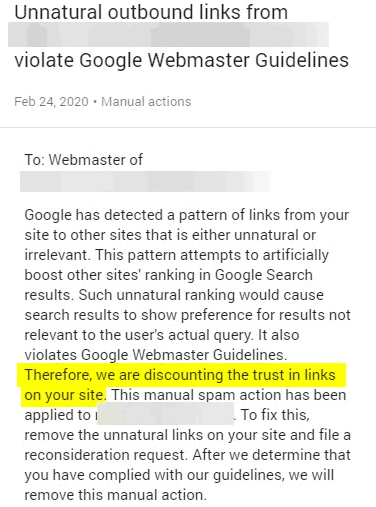From Google manual penalty actions for guest post
Google’s manual actions against guest posts
According to the first info collected by Search Engine Journal, it seems that Google has launched a zero tolerance intervention towards sites publishing guest posts and there are several reports of penalties for unnatural outbounding links.
In particular, in the case reported in the online newspaper we can find the message received from a publisher, whose site has undergone a manual action by Google that “noticed that some of his articles were guest posts” and therefore has “disabled his authority on his outbounding links” and “ignored the trust in site links”, thereby preventing them from generating PageRank to the linked site.
Penalty for guest post
More specifically, the Search Console message (shown below, directly from SEJ) reports that “Google has identified a link pattern from the site toward something else appearing unnatural or irrelevant” and that “attempts to artificially manipulate the search engine ranking”. This situation “forces search results to show pages not relevant to the user’s query” and violates Google’s Webmaster guidelines.
As penalty, Google is “ignoring the trust of your site’s links”, allowing the webmaster to “remove unnatural links on the site and send a reconsideration request“.
The reasons behind Google’s intervention
The warning alert received from Google specifies that this manual action relates in particular to paid articles found on the site (which, among other things, does not explicitly specify that it accepts guest post articles ). The owner has admitted to having published guest post (one per week on average, over the last three months, so about 15) and reported that the outbounding links had a branded anchor text, therefore not optimized for keywords.
The interesting thing is that – in the example of a page with the problem attached to the message – Google carefully identified the incriminated link and guest post on a total of five outbounding links present in the article, and then exactly detected which link was for the benefit of the person who published the article.
How to solve the problem
- Identification of unnatural links on the site, or “those added in exchange for some kind of compensation, such as money, goods or services, or reciprocal exchange”.
- Removing or using a nofollow on these links.
- Reconsideration request with the indication of the activities undertaken in order to solve the problem.
Outbounding links not properly marked
There is no need (not that much) to panic: reading the other reports reported by Search Engine Journal, in particular the case raised by Alan Bleiweiss on Twitter, you can quite see a reason behind this search engine activity, that seems to be linked to a wrong use of the marking of outbounding links.
In the post on the social network, the forensic SEO consultant explains that one of his clients received notice of a manual penalty action for outbound links, which indicated as example an article marked as “sponsored“. Going deeper, however, it turns out that such marking was only reported in the onpage content and not through the use of a nofollow or sponsored rel: in short, the reader could know that the article had been paid, but for Google was “regular” and with outbounding follow links.
A frequent case and often tolerated on so many sites, but that clearly the search engine decided not to tolerate anymore and to fight back.
To always use the nofollow on links within guest posts?
So we are facing two “news”: on one hand, Google is looking carefully (again) at the world of outbound links and guest posts as tools to manipulate the ranking, intervening with manual actions and penalties (at least when links are marked as follow). On the other hand, Google asks to use the nofollow attribute more accurately because it does not want to discourage connections between sites (which we know are fundamental for the search engine and the actual net of the Web itself) also using perhaps the new rels of the links introduced last September.
Apparently – as we are waiting for any official communications from Mountain View – accepting and publishing guest posts (even with paid links) is not wrong but it must be pointed out to the bots that such connection is precisely the result of an agreement, using the nofollow or sponsored rel, especially if on the page we provide conflicting information (such as, indeed, sponsored/promotional contents etc.). The conclusion reached by the article on the Search Engine Journal is that “to continue with the strategy of publishing guest posts with follow links could therefore be risky, at least at this stage”, because there would be a “Google’s new tactic to battle the most popular link building strategies”.
While waiting to see how true this is or how these cases fit into the normal checking operations by the search engine in its activity against spam and attempts to manipulate the ranking, what we can recommend is to avoid putting into practice risky strategies of link building and entrust this activity to experienced and serious professionals, who know how to properly manage the tactics and avoid errors and problems at the site.





